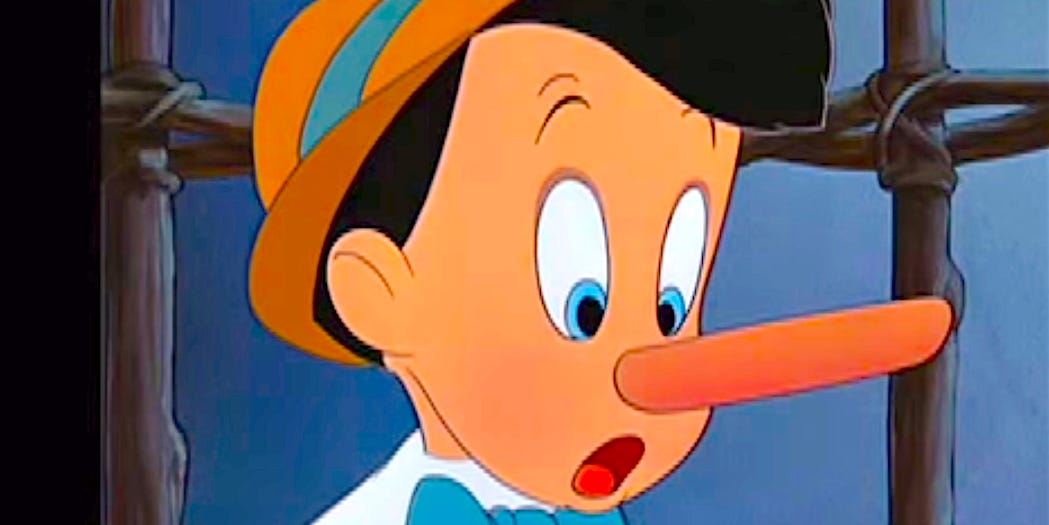Disney is fending off an activist campaign from the billionaire investor Nelson Peltz and his Trian Partners firm. It just deployed one of its classic characters to help it win the fight: Pinocchio.
The entertainment titan filed an investor presentation with financial regulators on Wednesday titled “Correcting Trian’s Fiction with Facts.”
Disney couldn’t resist including a picture of a shocked Pinocchio watching his nose grow to underline its view that Peltz and his team have been spreading inaccurate information:
Pinocchio on the opening slide of Disney’s investor presentation.
Disney/SEC
“Pinocchio” tells the story of a wooden puppet brought to life by a woodcarver. Pinocchio soon discovers that being deceitful causes his nose to lengthen, which has become a symbol for speaking falsehoods.
Trian controls about 32.3 million Disney shares, or a 1.8% stake. It wants Disney shareholders to vote Peltz and another nominee onto the board instead of two Disney directors seeking reelection.
Peltz filed a letter to Disney shareholders this week titled “Shareholders Can’t Afford Another Boom and Bust Sequel.” It blasted Disney’s management for a decade of underperformance, failing to deliver on their promises, and “years of seemingly poor choices and failed strategies.”
Trian has proposed an overhaul of the guest experience at Disney’s theme parks, a board-led review of the company’s creative processes, a revamped streaming strategy, and better-aligned executive compensation.
‘Understand the magic’
Disney has fired back at Trian’s “Restore the Magic” campaign, labeling Peltz a disruptor and destroyer of shareholder value who knows little about the media business. The company also questioned his conviction by pointing to his sale of roughly 500,000 shares last quarter.
“You don’t manage creativity the way you manage a hedge fund,” Disney said in one rebuttal. “You cannot ‘restore the magic’ if you don’t understand the magic.”
Moreover, Disney included a list of Trian’s “false statements and inferences” in its Pinocchio presentation. The company defended its stock performance over the past decade, its board’s agility and independence, and how it compensates its top executives.
In a public statement, Peltz expressed disappointment at Disney’s “scorched-earth campaign,” dismissing it as an effort to distract from the board’s failures.
Disney’s fundamental strategy is to deliver a smash hit in one of its divisions, such as “Frozen” in its studio business, then maximize its financial value by deploying its characters in movie sequels, on cable TV and streaming, in theme parks, on cruises, in video games, and in musicals, as well as by selling branded toys and other merchandise.
Stock slump
But several Disney movies have disappointed since the box-office success of “Avengers: Endgame” in 2019, Disney+ subscriber growth has slowed sharply, and Disney has faced testy legal and political fights in Florida.
The stock peaked at more than $200 in March 2021 but crashed to a near-decade low of about $80 last September. It has rebounded by about 25% this year to about $112, but that’s still close to 40% below its record high. Disney is now worth just more than $200 billion — but that’s almost $60 billion less than Netflix.
CEO Bob Iger has openly admitted Disney needs to revitalize its business. But he’s argued that it’s already doing so and that electing Peltz and his fellow nominee to the board won’t help the situation.
Recruiting Pinocchio to the cause probably won’t change anything, but it signals that Disney is happy to wield its characters to make its case.
Disney and Trian didn’t immediately respond to requests for comment from Business Insider made outside normal working hours.
Correction: March 14, 2024 — An earlier version of this story misstated the year “Avengers: Endgame” was released. It was released in 2019, not 2021.


